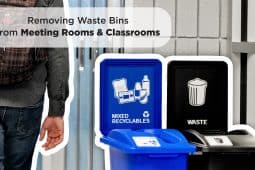Due to the recent pandemic, thousands of employees have experienced the huge shift of moving from a traditional workspace to home offices. For organizations that put sustainability at the forefront and are diligent about educating workers about recycling programs, how do these efforts continue when staff are offsite?
As you might suspect, there are many reasons why recycling at home might pose different challenges to your remote employees. But rest assured, your sustainability efforts can still succeed! In this article, we outline some challenges and solutions that can help maintain your program and even encourage your staff to improve their home recycling habits.
Recycling Behaviors
It is common for people to change their behaviors at the office, such as the way they speak, dress, eat, and even recycle. In many cases, people learn how to recycle based on their experiences in their workplace but a sense of comfort and may cause them to act differently at home. When people are working in their home offices, there may be a decrease in their amount of daily recycling if they fall into a pattern of apathy or have a lack of access to recycling at home.
Regional Differences
Recycling collection programs can be vastly different depending on what city, town or municipality you may be in and this can be especially frustrating for people who may work in a different area than where they live. Some items that are recyclable at work may not at home, and vice versa. So, when employees are encouraged to recycle a certain way at the office, it is often confusing for them to try and adopt new habits at home. Although this seems like a minor problem to some, recycling confusion is a major reason why people choose not to recycle.
In addition to the conflicting guidelines, some cities do not have convenient access to recycling at all. According to the Economist and Huffington Post, 25% of Americans don’t have access to curbside recycling, causing them to avoid recycling altogether. This can cause a major difference in recycling behavior with the shift to working from home.
Less- Frequent Container Placement
Another reason recycling could be less convenient at home is the lack of containers in convenient positions. Although many people may have added waste baskets to their home offices or under their desks, it is not as common for people to add a recycling stream in those same locations. Whether they are eating at their desks or simply throwing away paper, a recycling bin is just as frequently needed at home as it is in the office. If there is no recycling bin in the office area, but there is a waste basket, many people will choose to throw their recycling in the trash over walking it to their recycling bin in the kitchen, garage, or closet.
Lack of Social Pressures
In addition to all of these inconveniences, the lack of peer encouragement can be extremely discouraging in work from home environments. Many people recycle much better under social pressure than they do on their own. According to Colgate University, studies show that people are more likely to recycle when others in their peer group do as well. Studies have also found that people are more likely to recycle if they are being watched by others while disposing of their waste and recycling. This community watch system is not as effective from home working environments, as employees are much more independent. Without anyone to witness, it is much easier for people to throw recyclable materials in the trash out of convenience.
The Flip Side
Wow, this is sure starting to sound like recycling is doomed in the work from home era, isn’t it? You’ll be happy to hear that’s not true at all! As much as recycling poses some new challenges with remote work environments, it can also thrive in these settings! For example, waste reduction rates are lower due to less food packaging. Since people are leaving their home less, they are far less likely to purchase takeout foods during working hours. A survey performed by Fooda found that 95% of participants buy lunch at least once per week! We’re betting that that number has drastically decreased during the pandemic, meaning a major decrease in food packaging and waste as people eat what they have at home.
Many people also find it even easier to recycle at home than in the office. Although we just listed a whole bunch of reasons why recycling might be more difficult at home, there are many people who are not at all affected by these challenges. In fact, this journal from Method explains why people are more likely to recycle at home than at the office, meaning that these same people have likely increased their recycling rates since working from home.
SO what can we do?
Whether you are a manager or not, there’s lots you can do to get staff/fellow employees on board with recycling from home! The most important thing to do is to continue to encourage and educate about recycling, just as you would when you were in the office (if not more).
Here’s a list of ways you can help encourage your colleagues to continue recycling from home:
- Encourage staff and colleagues to place a recycling bin under their desk, just as they would have at work. If employees are working from home permanently, look into including recycling bins in the home office budget, or give them their deskside bins from the office if they are no longer in use.
- Make regional recycling guidelines available for your staff for surrounding areas. Not everyone lives in the same city that they work in, so making these guidelines available in online format will encourage employees to adapt to the changes and get in the habit of recycling properly at home.
- Remind staff that recycling is still very important when they do come into the office. If they know that this behavior is still important to the company, they are more likely to be excited about recycling outside of the office as well.
- – If your company or team is extremely passionate about diversion rates, start a friendly competition between your employees (or ask your manager to start it). Games and competitions offer and incentive to motivate employees to recycle at home!
- Lastly, share this article with staff/colleagues! There are many resources that promote recycling that will help offer home-recycling solutions to make sure your company’s recycling habits maintain their results through the transition to remote work.
While we are all adjusting to the ‘new normal’ of working from home, we hope that these tips leave you feel encouraged that sustainability is still just as important as ever and recycling success can still happen away from the office.







